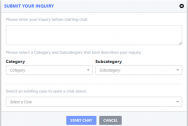Using Your HR Help Desk to Predict (and Prevent) Employee Defection
 Many corporate HR departments are enjoying the benefits of a robust HR Help Desk. Critical to HR is the ability to track every employee request or issue, while maintaining a comprehensive permanent record of each and every case. Equally critical is the means to provide consistent and accurate responses, and compliance with company SLA terms. HR Help Desk systems are designed specifically to provide those services and more.
Many corporate HR departments are enjoying the benefits of a robust HR Help Desk. Critical to HR is the ability to track every employee request or issue, while maintaining a comprehensive permanent record of each and every case. Equally critical is the means to provide consistent and accurate responses, and compliance with company SLA terms. HR Help Desk systems are designed specifically to provide those services and more.
Other systems, such as Talent Management applications, provide tools to ensure the smoothest recruiting, onboarding, training and development possible, as well as managing the full lifecycle of the employee’s tenure with the organization.
So what happens when the unthinkable occurs and an employee decides to leave? Especially a valued employee. While the wheels are already turning rapidly for the employees planned exit, unfortunately “rolling stones gather no moss”, as they say.
And what happened when HR had done the best they could to find the most qualified recruit, and had taken care to ensure the offer was in line with the candidate’s expectations — that there was a cultural fit and perceived synergy between the employee and his/her new manager? All the right boxes are checked, but the employee’s mind is still made up to move onward.
It is impossible to predict with any certainty why any particular worker, seemingly happy and thriving in their position, may be considering leaving the organization. Sometimes the reasoning is unique to the individual and entirely out of the company’s control. However, for many others there may be predictors, and these predictors often live within the HR Help Desk system database.
Studies have shown that costs associated with replacing an employee can equal 50% or more of the employee’s annual salary, so there is tremendous financial incentive to retain productive employees.
Let’s take a high level look at what employees want in general from their employer. Usually these benefits fall into three basic categories:
- Financial
- Career growth
- Work-life balance (Health & wellbeing)
What about job security and stability? Well this is not necessarily critical (or even important) to many younger workers who take a less-practical view of their budding careers, opting more for “excitement and adventure”. Just look at the trend towards interest in extreme sports among millennials. With these workers, early recognition of a potential flight is very critical to hopes of retention.
How can the HR Help Desk identify at-risk employees? By shaping broad categories and subcategories of case types around the three motivation factors listed above, HR can build the type of analytical reports needed to identify risk factors at an early stage in the employee’s lifecycle with the organization. Below are some examples of well-defined case categories/subcategories:
- Financial
- Payroll – Paycheck issues
- Payroll – W4 Changes
- Benefits – 401k distributions
- Benefits – Insurance coverage
- Career growth
- Performance review disputes
- Manager disputes
- Department Transfer requests
- Work-life balance
- Benefits – PTO requests
- Benefits – FMLA requests
- Tardy complaints
- Labor issues
These are but a few of the many examples of case categories/subcategories the typical HR Help Desk system tracks. So imagine running a report for an employee showing a manager dispute, 401k distribution question, and multiple PTO requests all within a few short months’ time. Might that be an indicator of trouble brewing with that employee? Any one of those cases may not imply any personnel issues with the worker, but as an aggregate the writing is certainly on the wall.
Now imagine HR without a Help Desk solution. Most of these requests would be handled by different HR personnel at different times. Without a summary analysis, it would be unlikely that HR would connect the dots and perceive any problems with that employee.
With LBi’s HR Help Desk Survey tool, HR can encourage employees to respond to custom survey questions. Packaged appropriately, employees will reveal tremendous insights not only into their view of the organization as a whole, but also what is on (and in) their mind. Rather than asking a loaded question like “Are you satisfied with your compensation package?”, a similar question might be “Based on your past and current experience, is XYZ’s compensation competitive in the industry?”. A yes or no answer to the first question simply implies they are or are not happy with their compensation. However, a response to the second question suggests they may or may not be comparing their current package to previous ones or even new offers. A lot of “no’s” might spell trouble. The survey results can identify specific employee responses or be summarized by department, division, etc.
At LBi we go far beyond merely setting up and supporting your HR Help Desk system. We combine our depth of industry expertise and best practices to bring the highest value possible to your investment. Let us demonstrate the many obvious and “hidden” benefits of LBi HR Help Desk.







Does LBi HR Help Desk predict which specific employees will be most likely to leave & when? Or are you talking about hypothetical benefits of predictive for help desk solutions in general?